- Home
- P. L. Gaus
Cast a Blue Shadow Page 15
Cast a Blue Shadow Read online
Page 15
“So, that means Martha’s apron doesn’t necessarily tie her to a murder,” Branden said after a moment.
“At the very least,” Robertson said, “it ties her to a dead body. Providing the blood matches.”
Branden shook his head sadly. “She found her, Bruce. Cleaned her up and cleared out, nothing more.”
Niell said, “So, who killed her, and how?”
Robertson tilted his chair back level. “Back to square one,” he said.
“OK,” Branden said. “Maybe Martha went back to see her, much later that night.”
“Why?” Robertson asked.
Niell said, “Mrs. Favor bawled her out. Called her cheap trash. Maybe Martha went back to confront her.”
“At 5:00 A.M.?” Robertson asked.
“Or, maybe she went back for Sonny,” Niell proposed.
Branden privately thought that was as plausible as anything he had heard, but he said, “She might have gone back to talk to his mother.”
“This is all conjecture,” Bruce complained. “The whole thing runs in circles.”
“It explains how she got blood on her apron,” Niell said.
“We can’t even be sure how Juliet Favor died,” Robertson said.
“What did Missy tell you, exactly, Bruce?” Branden asked.
“The blow to her head was delivered post mortem. There were no toxins in her system. The green pitcher and sink traps held water only. Well water to be specific. The little medicine bottle held DMS something.”
“DMSO,” Branden said. “She rubbed that on her temples for headaches.”
“You know about that?” Robertson asked.
“Dick Pomeroy told me. It goes right into the skin.”
“Could have been a sedative or something mixed in with that,” Niell offered.
“Missy checked,” Robertson said, shaking his head. “It was just DMSO and water.”
“Is she sure?” Branden asked. “Is her test reliable?”
“For the most part. She did that GC test and had a bunch of graphs. But all the bottle held was DMSO, plus water. Even had the same trace impurities as drinking water.”
Branden frowned. “Missy can’t find a cause of death?”
“Not at this point,” Robertson said. “When I left her, she was planning on a more complete autopsy. Gonna send samples out, that sort of thing.”
“Good grief,” Branden said, rubbing his temples. “It could have been anyone.”
“Or more than one,” Niell said. “I mean, one person to kill her, however that was done, plus another to clunk her in the head, after she was dead.”
“Clunk her with what?” Robertson asked.
“Then Martha came on the scene last,” Branden said. “That exonerates her.”
“Clunk her with what?” Robertson repeated.
Niell shrugged and said, “Also, when?”
Robertson unwrapped a stick of gum and popped it into his mouth.
Branden blinked double and stared at the sheriff. He looked around the room, studied Robertson’s desktop, and shook his head. Incredulously, the professor said, “You’re not smoking!”
Robertson smiled. “Wondered who’d be the first to notice.”
Niell whistled. “It has been some kind of day.”
“Is it Missy who has finally gotten you doing this?” Branden asked.
“Sort of,” Robertson said.
“Way to go, Missy,” Branden said.
Niell gave a thumbs-up.
“You don’t seem unusually grouchy or impatient,” Branden said.
“I’m not!” Robertson growled. “I’m on the patch.” He rubbed the outside of his left arm, where the nicotine patch lay under his sleeve.
Branden whistled a low, respectful note.
“Anyway,” Robertson said, “this isn’t about me. I want to talk to Martha Lehman.”
“Bruce, we all do,” Branden said.
“If what you propose is true, she was the last person in the bedroom before Sonny found her dead this morning.”
“And the trouble with that,” Branden said, “is anyone could have killed her. Anyone could have hit her over the head. Might have been the same person, might not.”
“That’s not the biggest problem we have,” Robertson said.
“Right,” Niell agreed. “We still don’t know how she was killed, let alone when, or by whom.”
29
Saturday, November 2 1:45 P.M.
AFTER lunch Saturday, Professor Branden followed a salt truck heading west on Route 39. Near the high school, the truck swung out and around a buggy struggling through the deep snow, and Branden did, too. In the rear of the buggy, four small children in denim coats looked out the back opening of the rig, studying Branden’s car, and waving shyly as he passed. As he came around into his lane, Branden glanced in the rearview mirror and saw stern Amish parents bundled in black wool coats, with a heavy blue blanket pulled up over their knees. The father had on a black felt hat with broad brim and round dome, and the missus wore a black bonnet tied closely against her cheeks.
The professor pulled into the drive of the Favor residence, and the buggy clattered by on the wet pavement behind him. At the front door, the deputy on guard took down the yellow crime scene ribbon, and Branden went inside. Once he had his coat off, he walked slowly through the house. He studied the layout for about twenty minutes and then heard a commotion at the front door. Returning to the foyer, Branden found Henry DiSalvo arguing with the deputy about access to the house. DiSalvo saw Branden and said, “Mike, let me in. The Favor children want some clothes.”
Branden signaled the deputy to admit the lawyer and said to DiSalvo, “You can’t take anything, Henry. You know that.”
“They’ve all taken rooms at the Hotel Millersburg. They don’t have a change of clothes or overnight bags. Thought I could at least pick up a few things for them,” DiSalvo said. He draped his coat over an armchair and followed Branden into the parlor.
“You’re not staying with the Favors?” Branden asked.
“Their New York lawyer is finally here. Landed a Lear jet at the Wayne County airport,” Henry said. “It’s a good thing, too, because I am completely worn out.”
“I wondered how you were holding up, Henry.”
“Criminal law is too much pressure. I like estate practice. Trusts, wills, that type of thing.”
Branden had dealt with DiSalvo a year and a half ago, on an Amish inheritance of several million dollars. And DiSalvo had managed Branden’s trust after his parents had been killed in a car accident involving a buggy when he was a boy.
“Even if it is just trusts and wills, Henry, I imagine the Favor account is enough to keep ten lawyers busy.”
“Oh, I manage. I’ve been working for Juliet Favor since before her husband died,” DiSalvo said, and took a seat on the yellow-flowered divan.
“I suppose you can’t talk about their inheritance,” Branden said, and stood by the cold fireplace. “Is this the rugby trophy Sally threw at her mother?” he asked.
DiSalvo said, “Yes,” and rose. At the mantel, he took the brass figure of men tangled in a scrummage, and turned it around to face the other way. “Guess I put it up backwards,” he remarked.
“How would you know?” Branden asked.
“I’ve got a duplicate in my office.”
“I thought it looked familiar.”
“Harry Favor was captain one year when I was coach. I’d started my practice in Millersburg, and I served as rugby coach at the college for several years.”
“You’ve known the family a long time, Henry.”
“I knew Juliet and Harry when they were just kids. Juliet was a poor Tennessee mountain girl, come to the big college up north. Harry was a senior her freshman year. He fell in love with her the first day he saw her. They were married the day after she graduated.”
“Big romance?”
“Star-crossed lovers, actually. His family was wealthy. Big upper East Coast ty
pes. Didn’t approve much of plain Juliet Johnson.”
“That’s ironic.”
“How so?”
“Juliet evidently had the same objection to Martha Lehman.”
“Right,” DiSalvo said, contemplatively. “One forgets one’s roots.”
“Or tries to,” Branden said. “How much are these two kids worth, now?”
“In the neighborhood of 100 million dollars. That’s 100 million each, conservatively. There’s also a trifle, something like eight or nine million, provided for the college.”
Branden shook his head. “Sonny said it was something like that.” Putting a college kid together with that kind of money was something his mind resisted. He wondered, momentarily, how nine million would work out for the college. “Juliet was going to cut them off?” he asked.
“She only threatened to,” DiSalvo said, “and then, only to a certain extent. But you already know that.”
Branden took a seat in an armchair next to the fireplace, and DiSalvo returned to the divan. Branden mused, “That’s a powerful motive for murder, Henry.”
“You’d think so,” Henry said. “But Sally never really cared about money. Just wanted a normal mother to love her. So, they fought all the time.”
“And Sonny?”
“Juliet explained to him last night that she intended to change the will. Sally would get a fourth in cash, Sonny half, and Millersburg College the last fourth, but Sonny would have to jump through hoops to get his. It was the same in the trust his father had left him. The same on three counts, actually—whether he got his trust or inherited through the old or the new will. He just learned about that last night.”
“What kind of hoops?”
“School, MBA, that type of thing. Juliet explained it all to him. Whether through his trust, activated when he reached twenty-one, or through an inheritance whenever Juliet died, Sonny Favor was on the treadmill for the rest of his life.”
“Not Sally too?”
“No, and I don’t know why. Sally just gets her share in a lump sum, one time. Sonny gets the true wealth—companies, holdings, properties, directorships, etc., but he has to toe the line for it. And Juliet laid that all out for him last night.”
“That’s an awful lot of money for a kid like Sonny to handle,” Branden said.
“She knew that. So, she was all set to sell off a dozen companies or so. Simplify the estate for him. He’d keep the simple manufacturing concerns, but high-technology companies like pharmaceuticals and computer chips were set to go.”
“And it’s still worth 100 million to him?”
“That’s just the current valuation. Properly managed, the whole thing could double itself in ten years, even in this market. Juliet knew Sonny would have to measure up to pull that off, but she thought it was a good carrot, so to speak.”
“Why are you telling me all this, Henry?” Branden asked.
“Their new lawyer thought I should,” Henry said. “Wants it known to Sheriff Robertson that neither Sally nor Sonny had a real motive to kill Juliet Favor.”
“I guess not,” Branden said.
Henry DiSalvo excused himself and left, and the fireplace drew the professor’s attention again. He thought of Sonny and Sally at the Hotel Millersburg, working out their futures with their lawyers. Amazing, the amounts involved, he thought. Branden tried to imagine the impact that that amount of money would have. Even for children accustomed to great wealth, to be handed so vast a fortune while still in college would have to be astounding. The pressure, decisions, weight of it all—absolutely astounding.
Branden rose slowly from his chair and faced the fireplace, with his hands behind his back. Heavy snow continued to fall outside, and the room was cold. He retrieved his coat, turned to go, and then abruptly spun back to face the mantel.
In the foyer, he took out his cell phone and called Melissa Taggert. In a few urgent sentences, he explained why he needed a technician with a fingerprint kit, and why he would be sending said technician back to Missy’s labs with a blood sample to test.
30
Saturday, November 2 6:20 P.M.
PROFESSOR Branden sat in front of the Saturday evening news so absorbed in his thoughts that he did not hear the weather treatise on the important patterns in “winds aloft.” His eyes were directed at the TV, but his mind held his attention elsewhere. He missed the overnight forecast for another eight inches of snow.
Caroline Branden sat next to him on the couch in the family room. She noticed the distant focus in her husband’s eyes, and reached across his lap to hit the remote button, turning off the set. The professor’s expression did not change. She let him drift in his reverie for nearly ten minutes and then nudged his elbow. No effect. She nudged again, harder, and he turned to her and blinked.
“Tell me again about the trophy,” she said.
Branden stirred and rubbed at the back of his neck. He saw that the television was off and asked, “News over?”
“I just turned it off.” She smiled and rose to clear coffee cups from the end tables. Standing in front of him, poised to carry the dishes into the kitchen, she tipped her head that way and said, “Come tell me about the trophy again.”
As she washed and he dried at the kitchen sink, the professor explained his deductions to her again, saying, “I wouldn’t have noticed it at all if Henry hadn’t turned it around to face the right way.”
“One would think a backwards trophy would be easy to spot,” Caroline said.
“It’s a stylized brass replica of men crouched in a low rugby formation,” he said. “You can turn it either way, and it wouldn’t look wrong.”
“So, how did Henry know the right way?”
“He was coach the year Harry Favor’s team won the championship. Has a twin to that trophy in his office. Might be the only person in the world who’d have known it was backwards.”
“So somebody like a maid just put it up wrong?” Caroline offered.
“Right,” the professor said. “Except for the fact that Henry himself was the last person supposed to have touched it, Friday evening before Juliet Favor’s dinner. He would have put it back on the mantel correctly.”
“What does that tell us?”
“I think it’s the key element to a number of facts in this case. Favor’s crushed skull, and a crack in the marble floor. Martha’s bloody apron.”
“Seems like quite a stretch.”
“We’ll know soon enough. There should be certain fingerprints on that trophy, and not others. The blood residue on it will match, or it won’t. Or there won’t be any blood at all. I don’t know. I’m trying to understand what role Martha played in all of this. Trying to understand the sequence of events.”
“You said Juliet Favor didn’t die from the blow to her head.”
“She didn’t.”
“And I’m sure you don’t believe Martha Lehman harmed anyone.”
“I don’t. That’s the whole point.”
With the dishes dried and put away, the Brandens took seats at the kitchen table, and their day drew to a close there, as it had begun, with pink coloring the sky. Twilight lingered, and then faded, and the neighborhood lights gave luminosity to the large snowflakes streaming down.
The front doorbell rang, and Caroline answered it and brought Evelyn Carson and Cal Troyer back along the long hallway to take seats at the kitchen table. Caroline put on a pot of coffee and set out four mugs, a Texas cattle scene, a New Orleans, a Phantom of the Opera, and a San Francisco streetcar.
Evelyn Carson began directly. “Cal says Martha stopped by the church late this afternoon.”
Caroline sat down across from the pastor with a hopeful expression.
Cal Troyer’s long white hair was pulled back, as usual, and tied off in a ponytail. His full white beard was short and neatly trimmed. He rested his stout carpenter’s arms on the tabletop and clasped his callused fingers together. There was a frown on his face.
“Sonny Favor told Martha that s
he might just as well go ahead and get an abortion,” Cal said. “Said he’d cover all of the expenses.”
“That’s big of him,” Caroline scoffed.
Evelyn Carson said, “I went out to Cal’s church after I left, Caroline. I thought maybe she’d turn up there, sooner or later.”
“Sooner, it seems,” the professor said.
“She’s been to some Wednesday services, from time to time,” Cal said. “Today she told me that you all know she’s pregnant.”
“You’re surprised?” Caroline asked.
“Not really,” Cal said. “It’s pretty easy to tell she’s got a wild side. She hinted about that Friday night. I found her alone in the sanctuary about a quarter to nine.”
“It’s not her fault, Cal,” Evelyn Carson said. “It’s the old abuse she’s never resolved. In cases like hers, that shows up as promiscuity.”
“I wasn’t just talking about sex,” Cal said. “She’s reckless. Seems like she doesn’t too much care what happens to her.”
“That’s all part of the pattern, unresolved childhood issues or troubling memories and dreams,” Evelyn said.
Branden thought about mentioning Martha’s affair with art professor Phillips Royce, and decided against it. Instead, he said, “Cal, do you know where she went after she talked with you?”
“She made two calls from the church, and Sonny Favor came around and picked her up in his 4x4,” Cal said.
“Great!” Caroline said. “That’s just great.”
“Did she confide in you, Cal?” Evelyn asked. “Really talk about important things?”
“Yes,” Cal said simply, and stroked his beard.
The three waited.
Said Cal, “I really shouldn’t tell you anything about it.”
The professor rose, carried the coffeepot to the table, and poured all around.
“This decaf?” Cal asked.
Caroline nodded.
Evelyn said, “Her state of mind is fragile now, even if she is talking again. I’d rather she weren’t riding around with Sonny Favor.”
Branden set the carafe down, stepped to the phone, and dialed Sonny’s cell phone. Into the phone he said, “Sonny? Right. Professor Branden. Is Martha with you?” With his palm cupped over the mouthpiece, he shook his head. Caroline came along beside him and leaned her ear to the receiver.

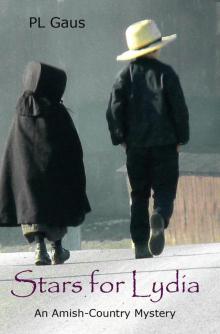 Stars for Lydia
Stars for Lydia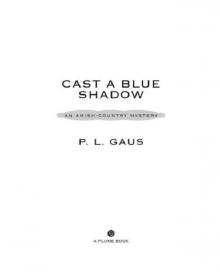 Cast a Blue Shadow
Cast a Blue Shadow Separate from the World
Separate from the World Clouds without Rain
Clouds without Rain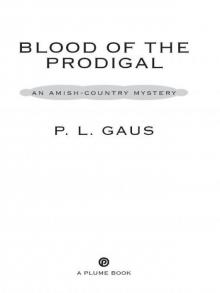 Blood of the Prodigal
Blood of the Prodigal Whiskers of the Lion
Whiskers of the Lion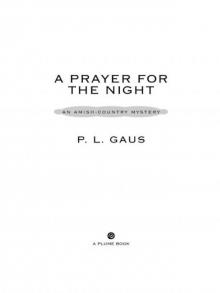 A Prayer for the Night
A Prayer for the Night Broken English
Broken English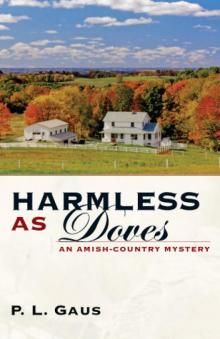 Harmless as Doves: An Amish-Country Mystery
Harmless as Doves: An Amish-Country Mystery